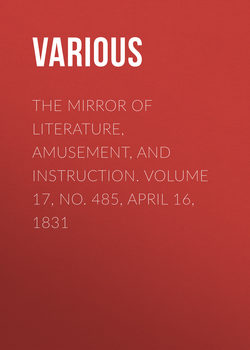Читать книгу The Mirror of Literature, Amusement, and Instruction. Volume 17, No. 485, April 16, 1831 - Various - Страница 3
MOCHA
VISIT TO CORFE CASTLE
Оглавление(From a Correspondent.)
This is Corfe Castle! the celebrated structure, the date of which, and the founder of which, are lost in antiquity:
"It stands to tell
A melancholy tale, to give
An awful warning; soon
Oblivion will steal silently
The remnant of its fame."
The castle is situate on the summit of a vast pyramidical mound, situated abruptly in an opening of the chalk range extending from Ballard Down to Worthbarrow in the Isle of Purbeck, county of Dorset. The walls are extremely thick, (12 feet in some places,) and are about half a mile in circuit. On the northern side the steepness of the ascent renders it inaccessible, and on the south is a deep ditch, over which is a bridge of three arches commanded by a gateway, flanked by two circular massive towers. The first ward has several towers. Passing onwards in a considerable ascent, we reached a second bridge guarded by a gate and towers, and entered the second ward, in which are the ruins of five towers. Winding round to the right, the explorer enters on the third and principal ward, which stands on the summit of the hill; here were the state apartments, store rooms, chapel, &c. built on vaults. The view from this portion of the ruin is magnificent. A wide expanse of flat country extending to Lytchett Bay and Poole, lies immediately at your feet. The gloomy fir trees wave in solemnity, and form in their darkness, a striking contrast with the dwellings that are scattered over the scene, and appear like specks of dazzling white; the estuary of Poole Harbour stretches along the distance like a mirror, and its molten silver-like appearance is broken here and there by small islands, among which Brownsea is conspicuous. Here we stood leaning over the northern battlement contemplating the face of a delightful country, smiling in peace,—from the stern and rugged fastness of war.
It was a bright summer’s day; strong masses of light and shade lay sleeping on the walls of the ruins, the dungeons were partially lighted by the rays which broke into their gloom, and it chanced to be a village holiday:
“Within the massy prison’s mouldering courts,
Fearless and free the ruddy children played,
Weaving gay chaplets for their innocent brows
With the green ivy and the red wall-flower,
That mocks the dungeon’s unavailing gloom;
The ponderous chains and gratings of strong iron,
There rusted amid heaps of broken stone
That mingled slowly with their native earth.
There the broad beam of day, which feebly once
Lighted the cheek of lean captivity
With a pale and sickly glare, then freely shone
On the pure smiles of infant playfulness.
No more the shuddering voice of hoarse despair
Pealed through the echoing vaults, but soothing notes
Of joy fingered winds and gladsome birds
And merriment were resonant around.”
Such were our feelings as we wandered musing and admiring amid the stupendous ruins of this once magnificent fabric.
“Now Time his dusky pennons o’er the scene,
Closes in stedfast darkness.”
The pomp of its splendour has passed away, and the stern wardour disputing entrance to the belted knight is now succeeded by a lank cobbler, who watches for lounging strangers, and acts as “Cicerone,” blending the most absurd and ridiculous stories in order to eke another sixpence from the purse of his auditor, and to add greater importance to himself; but he had a most amusing method of answering any startling questions as to date, by significantly observing in the purest Dorset dialect, “Why Lord love ye, zur, it wur avore the memory of ony maun in the parish!”
Apropos to dates, the earliest mention of Corfe is A.D. 978, when the Saxon annals narrate the murder of Edward, King of the West Saxons, committed here by his mother-in-law, Elfrida.
It was in the gloomy dungeons of this castle that King John starved to death twenty-two prisoners of war, many of whom were among the first nobility of Poictu, victims to the cruelty of a barbarous sceptered tyrant! Then again, we thought of the fate of Peter of Pontefract, the imprudent prophet, who, if he had turned over a page in the book of fate, should have folded down the leaf instead of incurring the monarch’s vengeance by meddling with state affairs.
It was in this fortress that the unfortunate Edward II. was murdered in 1372, by his cruel keepers, Sir John Maltravers, and Sir Thomas Gurney, who having removed the dethroned monarch from castle to castle, subjecting him to every hardship and indignity, hoping that ill-treatment might shorten his days. At last they determined amidst the profound security afforded by this impregnable castle, to effect his death in the most horrible manner, in order to prevent marks of violence being seen on his corpse, namely, by inserting a horn tube into his body, through which was conveyed a red-hot iron! Well may the traveller shudder at these ruins as they beetle over him in frowning ruggedness, for they have been the murderers’ den; and doubtless many a deed of slaughter has been committed in them, which has never come to light, under tyrannical power, which has never come to the knowledge of men or blotted the page of history.
